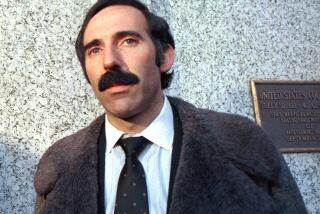Bilzerian Denies He Tried to Hide Deal With Jefferies
- Share via
NEW YORK — Paul A. Bilzerian, on trial for alleged securities and tax fraud, denied Wednesday that he had false invoices drawn up to hide an illicit trading arrangement with the Los Angeles-based brokerage firm Jefferies & Co.
The Singer Co. chairman’s testimony came as his defense lawyers struggled to formulate a new strategy in the face of an adverse ruling Tuesday by U.S. District Judge Robert J. Ward. The judge had ruled that if Bilzerian testifies he acted in good faith, believing that he was within the law when he filed allegedly false documents with the Securities and Exchange Commission in 1985 and 1986, then he would give up his right to keep confidential the advice he had received at the time from his own lawyers.
In questioning Wednesday, defense lawyer Arthur Mathews delicately avoided asking Bilzerian about how he came to prepare the SEC filings or why he believed he had acted properly. Among other difficulties, revealing the advice he had received from his lawyers could open the way for prosecutors to call them as witnesses.
Curtailed Questions
The main thrust of his defense so far has been that Bilzerian lacked any criminal intent and believed that he was acting legally when he filed documents relating to stock purchases in four companies that were takeover targets.
During a break in the trial, Mathews acknowledged that the judge’s ruling curtailed the questions he planned to ask Bilzerian. But he denied that it raises the chances that the one-time corporate raider would be convicted. “We’re going to win this case,” Mathews said.
Bilzerian, 38, faces 11 criminal counts under an indictment that charges him with arranging with Jefferies & Co. to buy and secretly hold for him blocks of stock in H. H. Robertson Co., Cluett, Peabody & Co., Hammermill Paper Co. and Armco Inc. The indictment charges that he had promised to protect Jefferies against loss and had false invoices drawn up to hide the true purpose of a $125,000 payment he made to the brokerage to reimburse it for part of a $250,000 loss it suffered on the H. H. Robertson Co. stock.
Disputes Testimony
On the witness stand, however, Bilzerian testified that he had no such arrangement with Jefferies and disputed the earlier testimony of Michael Landy, the Jefferies official who handled Bilzerian’s account. Bilzerian said he hadn’t promised to reimburse Jefferies for any loss, and initially refused to do so.
However, he said he did pay the $125,000 as a gesture of kindness after Landy had called him “in a panic” on Christmas Eve, 1985, claiming that Boyd L. Jefferies, then the chairman of Jefferies & Co., had threatened to deduct from Landy’s pay the $250,000 lost on the H. H. Robertson stock purchase. Bilzerian said he expected to get the money back from Landy the following year if his stock trading with Jefferies generated commissions worth $125,000.
More to Read
Sign up for Essential California
The most important California stories and recommendations in your inbox every morning.
You may occasionally receive promotional content from the Los Angeles Times.













